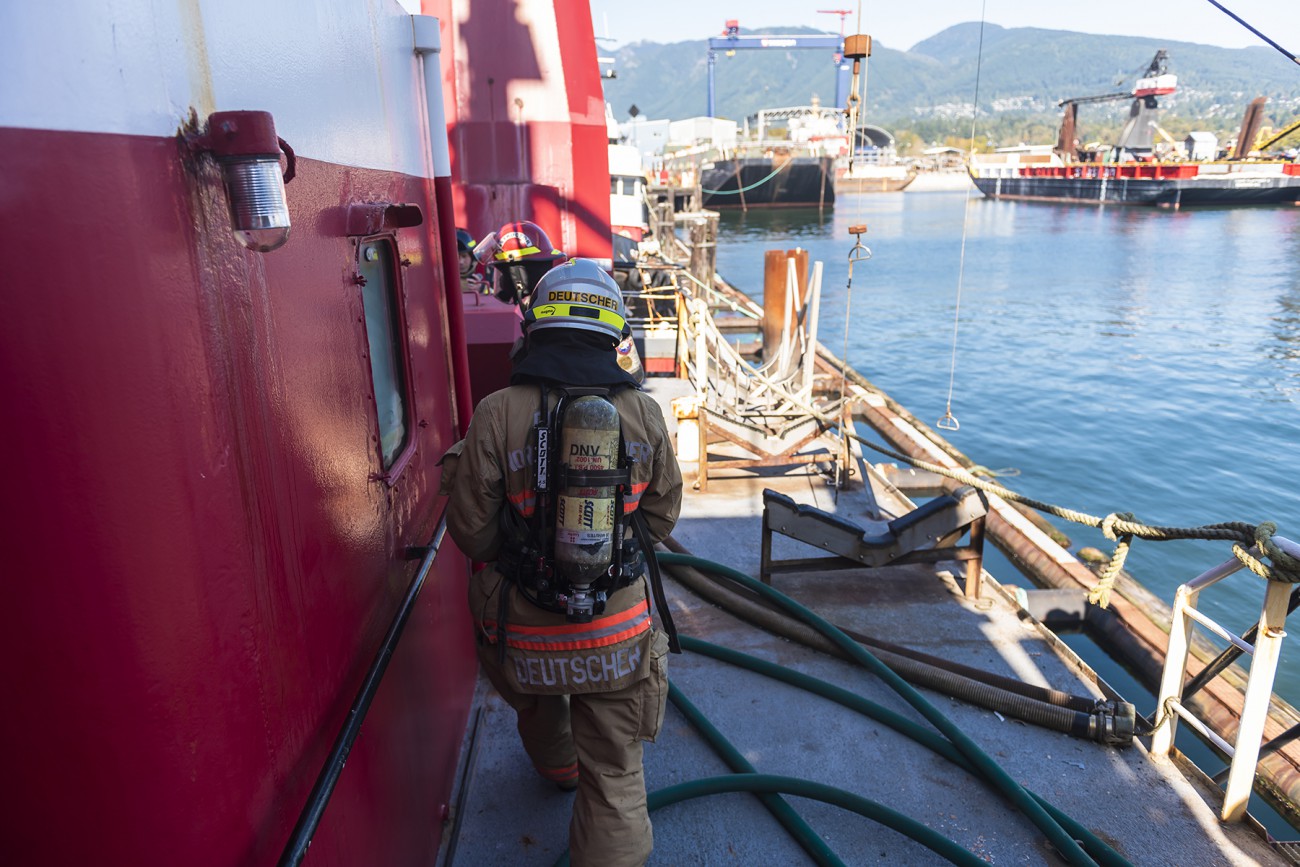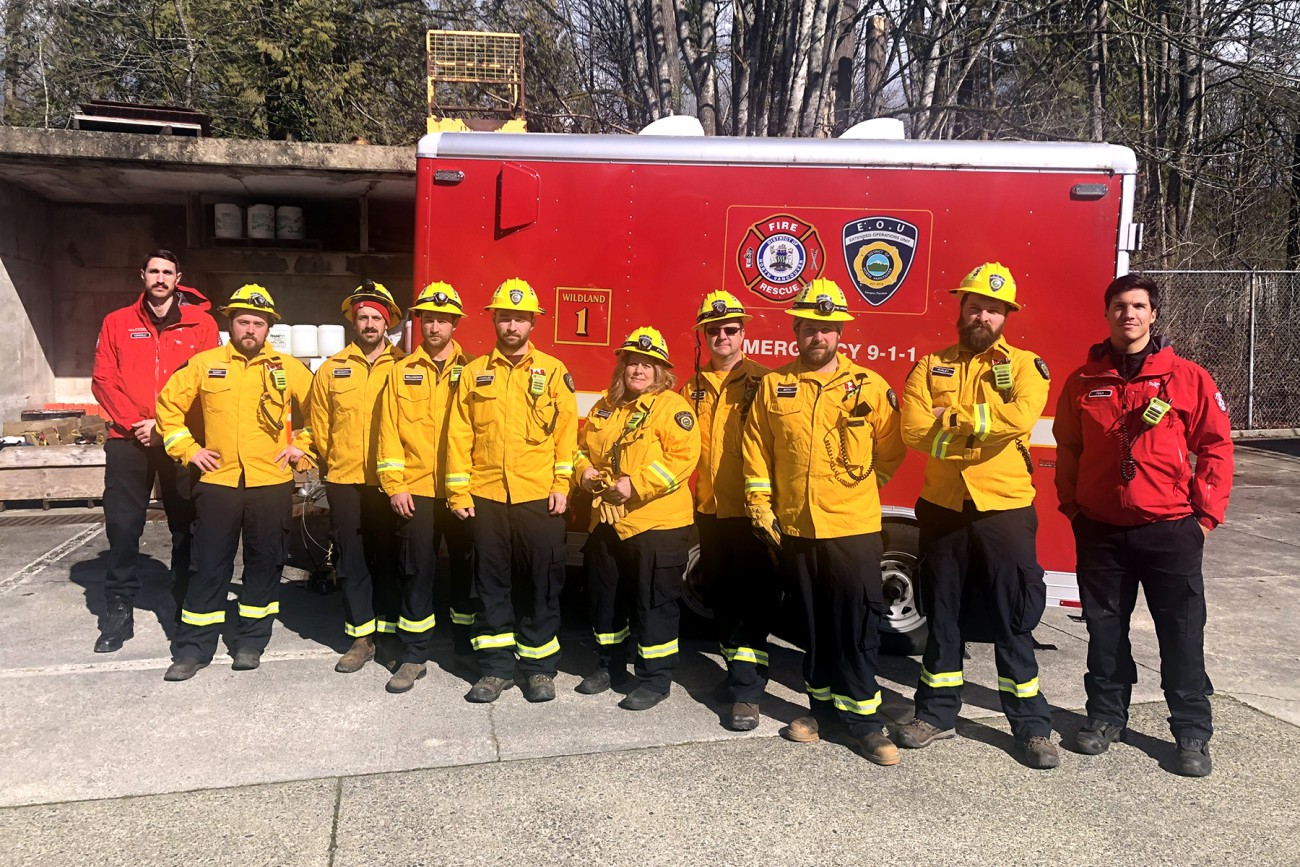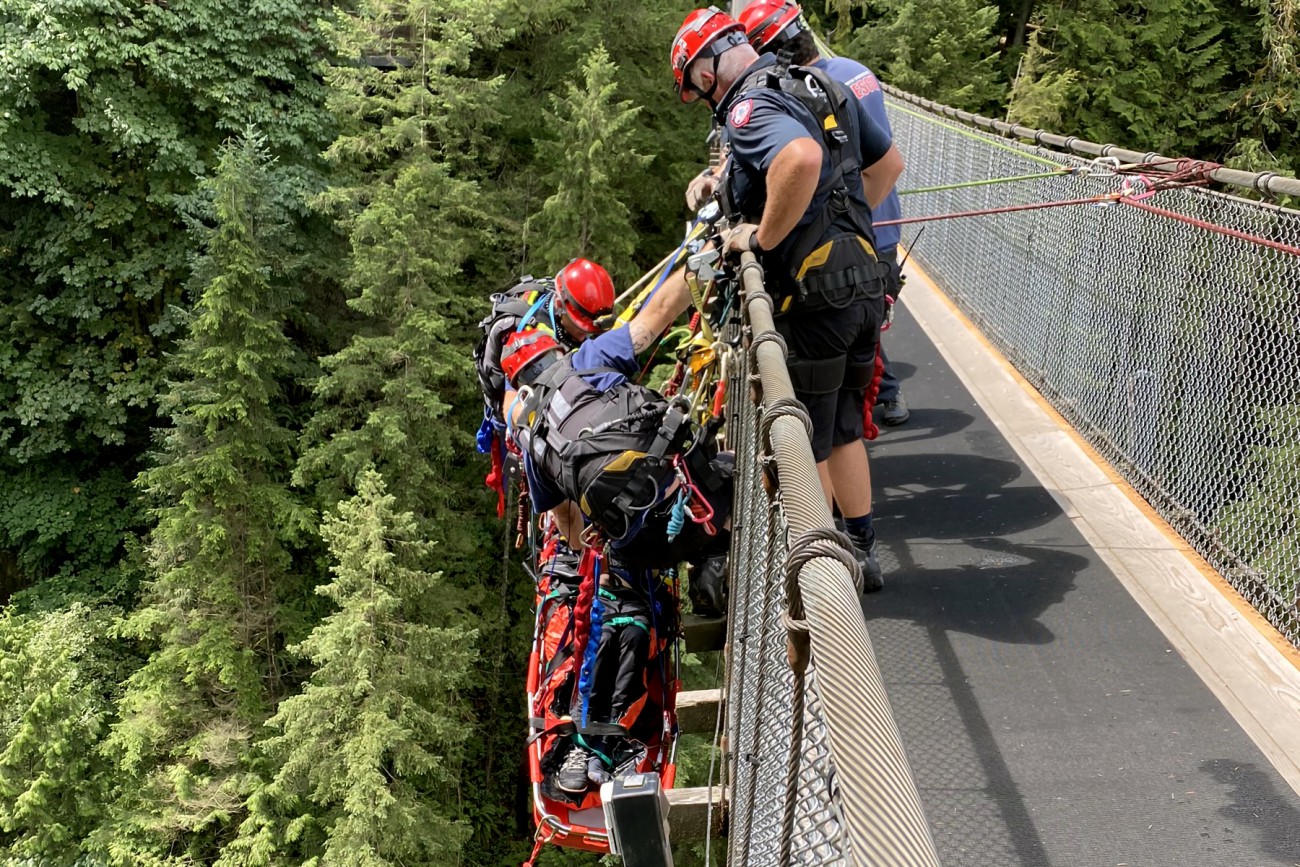Planning for emergencies
The ongoing COVID-19 pandemic is but one example of how the DNVFRS uses all-hazards planning to develop the capacity to deal with multiple emergencies that may impact the community. Helping prepare for, respond to, and recover from major North Shore-wide emergencies is a significant focus of our fire and rescue service.
Our comprehensive major emergency operations plan and pandemic/infectious disease plan are living documents that are continually updated to stay relevant and effective.
The COVID-19 pandemic has validated our established process and focus on planning for emergencies that are anything but routine. This experience in 2020 reinforced our capacity to deal with major emergencies.
North Shore Emergency Management
North Shore Emergency Management (NSEM) is an inter-municipal agency that provides emergency management services to all three municipalities on the North Shore. We work closely with NSEM on training initiatives and disaster relief exercises that emulate real-life response to scenarios such as urban interface fires, earthquakes, floods, and other emergencies.
NSEM is a valued partner agency that also supports the Disaster Emergency Readiness Training (DERT) program, which aims to improve the District of North Vancouver’s operational resiliency in the event of large-scale emergencies.
You can learn more about the work that North Shore Emergency Management does for North Shore Communities on their website.
35-Member Extended Operations Unit
We established the District of North Vancouver Extended Operations Unit (EOU) in 2018 to strengthen the response to local, naturally occurring emergencies, increase community resiliency, and facilitate swift recovery from a natural disaster.
The 35-member team consists of DNV employees — many of whom already have relevant skills and experience from their ‘day’ jobs (arborists, heavy equipment operators, and so on). In the event of earthquakes, landslides, floods, wildfires, and other natural disasters, this team would be called on to support Fire & Rescue.
During large or significant naturally occurring emergencies, this group of trained staff will enhance our capacity and capability to mitigate incidents.
EOU Training in 2020
Members participated in the following training opportunities to enhance emergency response skills and knowledge.
WILDFIRE BASIC FIRE SUPPRESSION AND SAFETY (S-100) AND WILDFIRE ENTRAPMENT AVOIDANCE AND SAFETY (S-185) (Refresher Training)
Official wildfire training courses by the Province of BC.
ARBORICULTURE CANADA ‘CHAINSAW SAFETY & CUTTING TECHNIQUES COURSE’
Delivered by Arboriculture Canada certified DNVFRS Fire Fighters/Instructors.
SWIFTWATER AWARENESS TRAINING
Delivered virtually by Emergency Management BC and Rescue Canada.
HELICOPTER LANDING ZONE TRAINING
Delivered virtually by British Columbia Emergency Health Service’s Aviation division.
Major Emergency Operations Plan
We are part of an annual tri-municipal training initiative that prepares us to respond to large-scale incidents that result in the failure of critical infrastructure, communications, and supply chains.
The Major Emergency Operations Plan (MEOP) was produced as a result of the District’s Earthquake Ready Action Plan, which is designed to strengthen our earthquake resiliency in four key areas — mitigation, preparedness, response, and recovery — by focusing on the people, buildings, infrastructure, and systems that are most vulnerable.
The plan is reviewed and tested annually by all three municipalities during field exercises that replicate a post-disaster environment when all resources are overwhelmed.
In 2020, 81 staff and 14 pieces of apparatus from all three North Shore fire departments participated in a daily exercise – over the course of four days – with 324 overall participants. During the test, crews went into the field during a simulated earthquake to review the structural integrity of District bridges, roadways, and other infrastructure and reported back on their findings.
The exercise in 2020 also incorporated a simulated activation of the Department Operations Centre (DOC), which is used to coordinate response activities, gather real-time intelligence, provide logistical and operations support, and maintain a chronological report of incidents and status updates in the event of an emergency.
The COVID-19 pandemic caused us to adapt, be flexible, and employ creative approaches to exercising this plan. The reality of potential concurrent events (for example, an earthquake during a pandemic) reinforced the importance we place on this approach across the North Shore. These adaptations allowed us to test our ability to set-up a mixed in-person and virtual DOC, which aligns with the very real situation where our chief officers and municipal officials cannot physically come together due to the nature of the emergency.
The timing of the field exercise aligned again with the annual Great BC Shake Out earthquake drill to coordinate the District’s earthquake initiatives with provincial efforts
Urban Search and Rescue
Urban Search and Rescue provides critical resources and a specially trained task force of personnel with medical, fire suppression, emergency response, search and rescue, and engineering backgrounds.
Teams deploy with trained dogs, electronic search equipment, and heavy construction equipment to remove debris and help extract people trapped in major structural collapses during naturally occurring emergencies such as earthquakes.
Our members regularly attend monthly training sessions alongside Canada Task Force (CANTF-1) members to build on our collaborative efforts.
Building on the parameters laid out by Public Safety Canada, the DNVFRS continues to work towards ensuring our firefighters have the training and equipment to be interoperable with our CANTF-1 partners.

Marine Firefighting
We are active partners alongside West Vancouver Fire & Rescue, North Vancouver City Fire Department, and Vancouver Fire & Rescue when responding to marine emergencies.
Over the past year, 20 additional North Shore firefighters received training to prepare for, respond to, and recover from several emergencies that can occur on the water, including 13 members from the District of North Vancouver Fire & Rescue Services. This increases the number of North Shore firefighters qualified to this standard to 80, including 53 from the DNVFRS.
This training program was delivered by the Justice Institute of British Columbia (JIBC) and hosted by our partners at Seaspan Vancouver Shipyards.
The programs are a model of interagency collaboration, with the following agencies actively participating in each session:
- Royal Canadian Marine Search and Rescue (RCMSAR)
- Royal Canadian Mounted Police Marine Unit
- Vancouver Fire & Rescue Services Fireboat
- Vancouver Police Department Marine Unit
- Port of Vancouver


